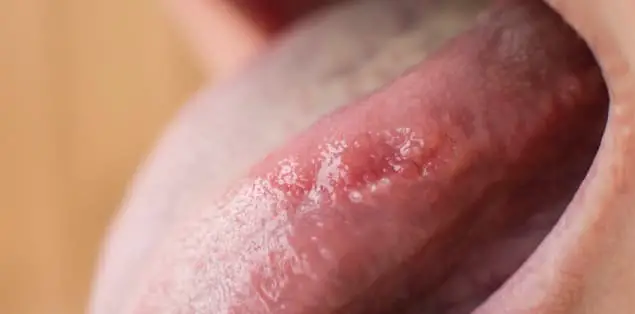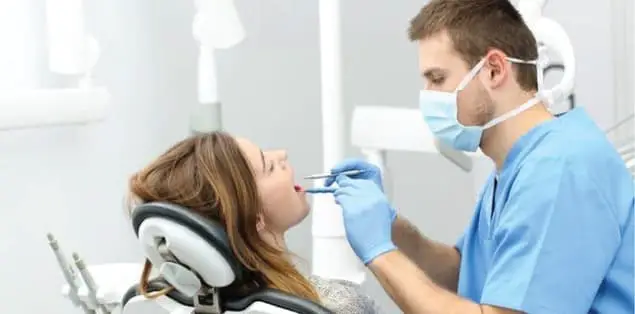The tongue is a very important muscle that helps us do things like breathe, eat, and talk. So biting your tongue accidentally is a pretty common thing. Most of the time, though, it’s nothing to worry about.
Biting your tongue has become a bad habit for many people, which almost everyone engages in.
So, let’s find out what causes tongue pain and how to stop biting in the future in the following sections.
Why Do I Keep Biting My Tongue When I Eat?

Coordination is the most common cause of people biting their tongues while eating. If you are eating very cold or hot items or eating very quickly, there is a greater chance that you will bite your tongue.
Before eating, make sure the food is at the appropriate temperature (either warm or chilled), and take your time.
How Can I Treat a Tongue Bite?
All of these things will help your bitten tongue heal quickly.
Use Ice on the Hurt Area

You can use ice cubes to relieve wounds, redness, and swollen tongue on the tongue that result from biting. The tongue will become numb, and the discomfort will diminish if you treat the area with ice or a cold compress.
Rinse With Salt Water

You should rinse open wounds for 20 seconds with warm, salty water. Occasionally repeated, this destroys bacteria and speeds healing.
Go to the Doctor’s

If you have tongue damage or extreme pain, see a dentist. They can examine your mouth and determine the source bitten tongue.
Say Strictly No to Hot or Spicy Foods

Eating spicy or hot foods will worsen your discomfort, especially if you have an open or recent wound. But, for the time being, stick to soft and light foods that don’t require much chewing.
Why Do I Keep Biting My Tongue When I Sleep?
Swelling, redness, and tongue pain cuts are possible symptoms of tongue injuries. Accidentally biting one’s tongue while eating is a common occurrence.
However, suppose you’re constantly biting your tongue while you sleep. In that case, you may have underlying disorders like epilepsy, teeth grinding, or sleep rhythmic movement disorder.
This is annoying, but doing it repeatedly leads to tongue ulcers, tongue scalloping, oral infections, and pain.
Fortunately, further treatment options are available, such as cold compress and mouthguard.
Biting tongue in your sleep symptoms:

It can be challenging to tell if you’ve been biting your tongue when asleep. You can identify nighttime tongue biting more easily if specific indications are present. Among them are:
- Tongue bleeding, redness, and pain
- Tongue ulcer
- Tongue abrasions or slashes
- Tongue infection
Common Causes
- Bruxism or Teeth Grinding
Bruxism can disrupt sleep (teeth grinding and clenching). This illness causes mouth damage and pain. In addition, bruxism can lead to people biting their tongues and cheeks.
We sometimes link stress and worry to bruxism and rhythmic movement disorder. For example, wearing a mouth guard at night may help those with sleep bruxism or sleep apnea.
- Facial Muscle Spasms
Muscle spasms might cause person bites in the middle of the night in the face and jaw. The chin may tremor excessively during sleep due to this disorder, particularly common in youngsters.
They cannot regulate their facial and jaw muscles while asleep and often bite their tongues.
- Nighttime Seizures
You can see bite marks on the tongue’s tip and sides. Tongue biting is a common symptom of nocturnal seizures.
People with epileptic seizures may accidentally bite down on their tongues during a seizure because they cannot regulate their bodies.
- Disturbance of the Heartbeat Rhythm
This illness primarily affects children. Humming sounds, body movements including rocking and head-banging, and rolling may result from further treatment.
Tongue biting can occur as a result of these quick motions.
- Sleep Apnea
Even though we don’t link sleep apnea directly to tongue biting, it’s common among people who suffer from sleep disorders in the first place.
People with sleep apnea frequently have huge tongues or muscles in the mouth that relax unnaturally during sleep.
How Can You Stop Biting Tongue in Your Sleep?
Lower Your Stress Level
Preventing sleep disturbances can be easier by learning stress management skills, cognitive behavioral therapy, and health conditions.
Yoga, meditation, and other forms of relaxation techniques have proven to be effective for certain bruxers.
A Research Into Sleep
Seeing a neurologist may be a good idea to prevent seizures at night or think you might have a seizure disorder.
They can carry out a sleep study on your behalf to learn more about what goes on in your brain when you are sleeping.
EEG machines are commonly used in sleep studies to measure your brainwave activity during the various stages of sleep.
You’ll be able to pinpoint the source of your tongue-biting tendencies more quickly if you do this.
Why Do I Keep Biting My Tongue When I Talk?

The pons, a brain region, control habitual behaviors, including biting, chewing, swallowing, etc.
We don’t have to give it much thought. We do it because it’s the right thing to do.
Despite their near-perfect synchronization, the pons occasionally get mixed signals and go missing a step.
An external stimulus, such as the desire to converse while eating, may drown out the signals that your pons are delivering to help control your tongue. This could be the case.
Tongue-Biting Cure
Consult your dentist or doctor for advice on which treatments are most appropriate for your condition. Additional treatments for sleep apnea include the following:
- Weight reduction
- Quitting smoking (this is something that can be difficult to achieve, but a doctor can help you discover a smoking cessation program that professionals have tailored to your needs)
- CPAP machine
- Surgery
What Does Biting My Tongue Mean?
Biting your tongue can become a habit if it goes from a one-time occurrence to a regular occurrence.
Because of the swelling caused by the initial bite, you may find it easier to nibble on it more frequently.
You can be dealing with a tongue raw or a crooked jaw. Please do everything you can to take care of it at home with the remedies listed above.
Also, see a dentist or healthcare professional if you think more serious underlying conditions, such as TMJ, cause your tongue pain.
When Should You Go to a Dental Professional to Treat Tongue-Biting?
- When you bite your tongue a lot, it might lead to sores and ulcers. You may find scallops on the top or sides of your tongue.
- Tongue-biting can result from sleep difficulties, stress, or snoring. Your doctor may offer therapy to prevent this.
- See a dentist if you grind your teeth. For example, a mouth guard, which you wear while you sleep to keep your teeth away from your tongue, may be prescribed by your dentist.
- Your dentist will take a mold of your teeth to ensure a perfect fit. To make a custom mouthguard, dental labs use a mold of your teeth and bite.
- Your dentist may recommend braces if your teeth or jaws are misaligned. Reduces the tendency to bite and protrude one’s tongue.
- Reducing the frequency and intensity of seizures may help alleviate nighttime tongue biting. However, you can reduce the danger of more severe tongue-biting by using more effective treatment.
Why Do I Keep Biting My Tongue in the Same Spot?
Itching the inside of your cheek is up there with paper cuts and coffee scorching in terms of tiny but incredibly irritating events.
In addition, a mouth bite has another painful element — you’re likely to bite the same region again.
Repeated mouth trauma causes the soft tissue that you may have damaged to expand. A traumatic fibroma is a common diagnosis and term for this type of tumor.
An insignificant wound is left behind when you bite your cheek, lips, or tongue. A recurrence of a bite, on the other hand, can jeopardize the healing process, resulting in the formation of extra scar tissue.
A callous is a type of fibrous scar tissue composed of collagen protein. It’s a clump of rough skin that protrudes from the otherwise flat cheek wall that you can often feel with your tongue. Because of its prominence, you’ll bite it repeatedly because it’s in the “line of fire” during eating or biting. If you repeat this cycle, there will be more noticeable scar tissue in your mouth.
If you keep biting the wound, it will heal most of the time. It’s possible to remove the lump if it becomes an issue surgically. Doctors will use a local anesthetic to numb the region before beginning the procedure.
Flattening the surface of the cheek is a simple treatment for the problem area. It only takes a few minutes to complete the treatment, and after a few days or a week, you won’t even notice it was there.
Although most of these lesions are innocuous, it is a routine procedure to biopsy the tissue removed: a pathologist examines it under a microscope for cancer cells.
Not to worry, this is a normal aspect of any medical procedure.
See us if you’ve got a lump for some time that you seem to be biting. However, we may be able to end this irritation once and for all with a simple treatment.
Final Words
For both children and adults, biting one’s tongue appears to be a common occurrence in daily life. You mostly bite your tongue unconsciously. However, you can treat minor injuries at home in most circumstances.
It’s important to keep an eye on the site for infection or heavy bleeding signs. A bit tongue is a painful but temporary injury typically caused by accidents related to sports or other activities. Seek medical treatment if you feel uncomfortable.
It is not always necessary to visit a dental office for a bit of tongue biting. However, suppose the bleeding is serious, and the person feels that there may be additional harm. In that case, they should seek medical attention and oral health.
It is feasible to reattach a segment of a person’s tongue, even if they unconsciously bite off a portion of their tongue. Therefore, the outcome of this procedure should be favorable.
You can also avoid harmful behaviors like chatting while chewing, nail-biting, and eating hard meals by being aware of your tendencies. For example, you can prevent tongue biting easily.
Finally, don’t forget to wear your mouthguard and take your medication for any underlying health issues, such as seizures or sleep apnoea.
